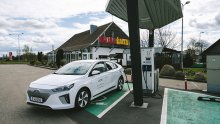The International Energy Agency estimates that global sales of electric vehicles could reach 14 million units by the end of 2023.

Global sales of electric cars are expected to rise this year to another record, expanding their share of the global car market to nearly a fifth and leading a major transformation of the auto industry that has implications for for the energy sector, especially oil.
The new edition of the year of the IEA World perspectives of the electric vehicle shows that by 2022 more than 10 million electric cars were sold worldwide, and sales are expected to grow another 35% this year to reach 14 million. This explosive growth means that the share of electric cars in the global car market has increased from around 4% in 2020 to 14% in 2022 and is set to increase further to 18% this year, according to the latest IEA projections.
“Electric vehicles are one of the driving forces of the rapidly emerging new global energy economy, and are driving a historic transformation of the automotive manufacturing industry worldwide,” said IEA Executive Director , Fatih Birol.
“The trends we are witnessing have important implications for global oil demand. The internal combustion engine has been unrivaled for more than a century, but electric vehicles are changing the status quo. By 2030 they will obviate the need for at least 5 million barrels of oil per day. Cars are just the first wave: electric buses and trucks will follow soon,” he added.
The vast majority of electric car sales so far are mainly concentrated in three markets: China, Europe and the United States. China is the leader, with 60% of global electric car sales there by 2022. Today, more than half of all electric cars on the road worldwide are in China. Europe and the United States, the second and third largest markets, saw strong growth with sales increasing by 15% and 55% respectively by 2022.
Ambitious policy programs in major economies, such as the Fit for 55 package in the European Union and the Inflation Reduction Act in the United States, are expected to further increase EV market share this decade and beyond. By 2030, the average share of electric cars in total sales in China, the EU and the United States will increase to around 60%.
The new report highlights that announced battery manufacturing projects would be more than enough to meet demand for electric vehicles until 2030 under the IEA’s 2050 net-zero emissions scenario. However, manufacturing remains very concentrated, with China dominating trade in batteries and components, increasing its share of global electric car exports to more than 35% last year.
In emerging and developing economies, the most dynamic area of electric mobility is two- or three-wheeled vehicles, which outnumber cars. For example, more than half of three-wheeler registrations in India by 2022 were electric, demonstrating their growing popularity. In many developing economies, two- and three-wheelers provide an affordable way to access mobility, so their electrification is important to support sustainable development.
Read the full report here.
Related contents



discuss


